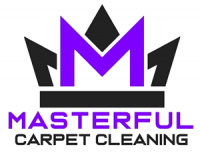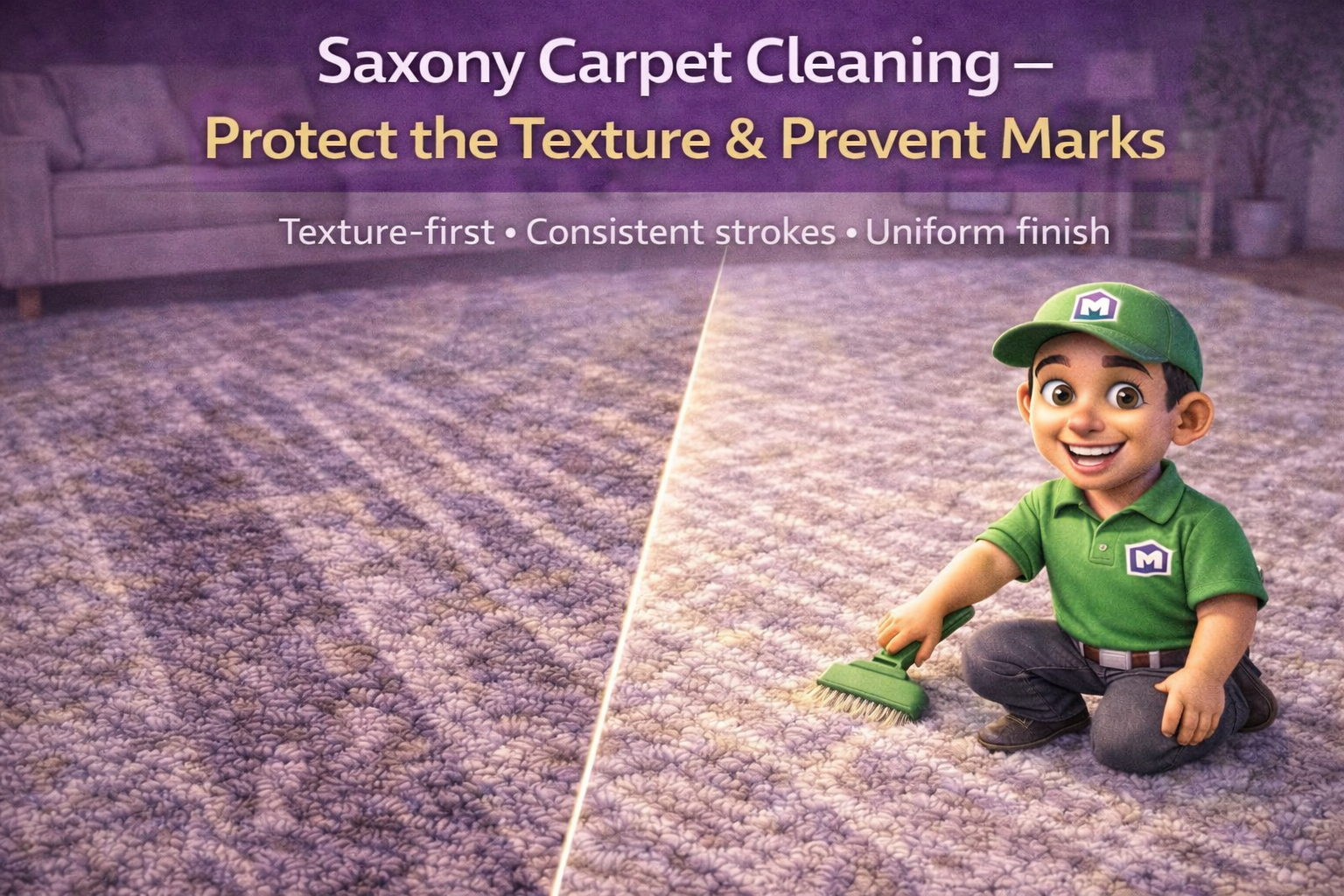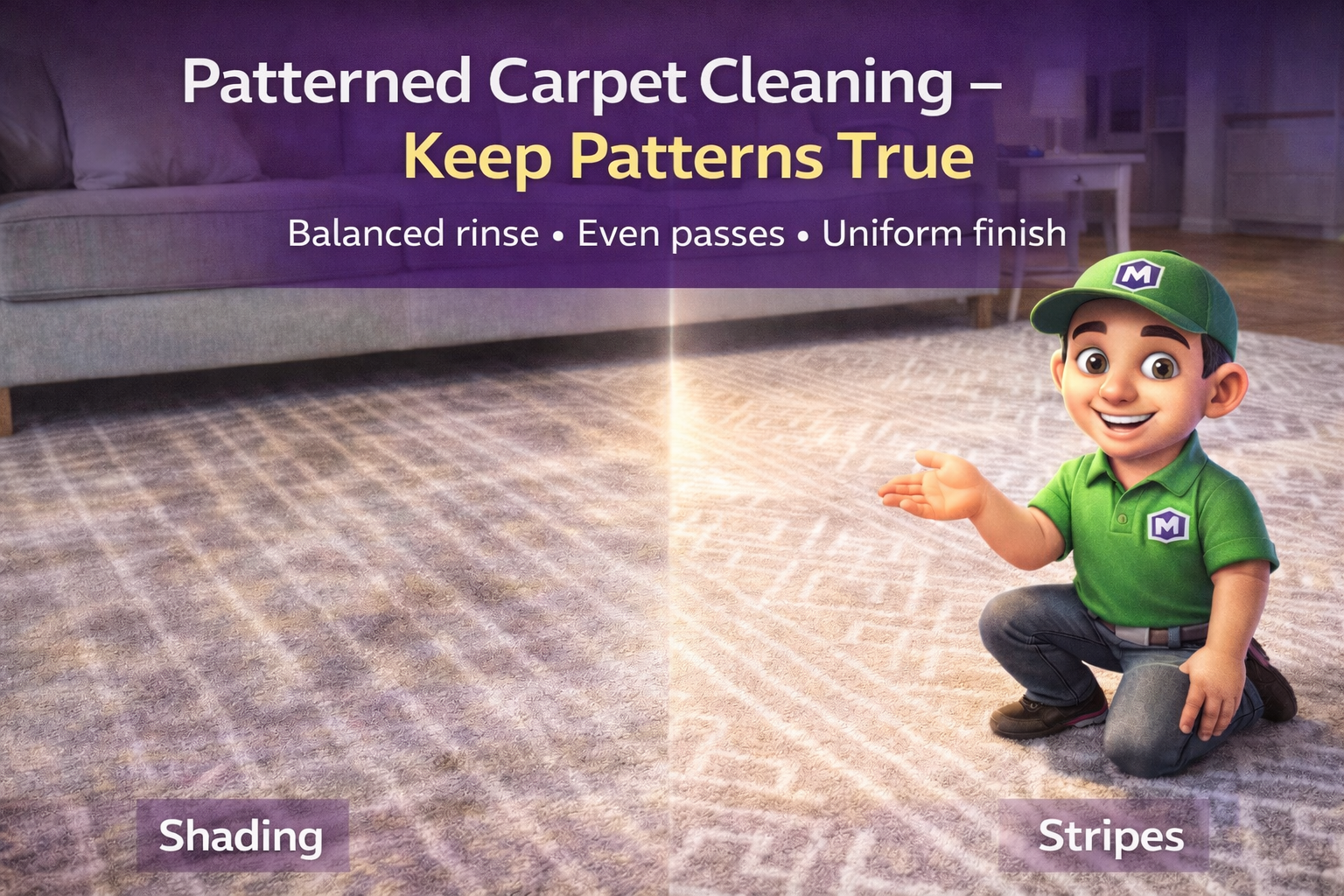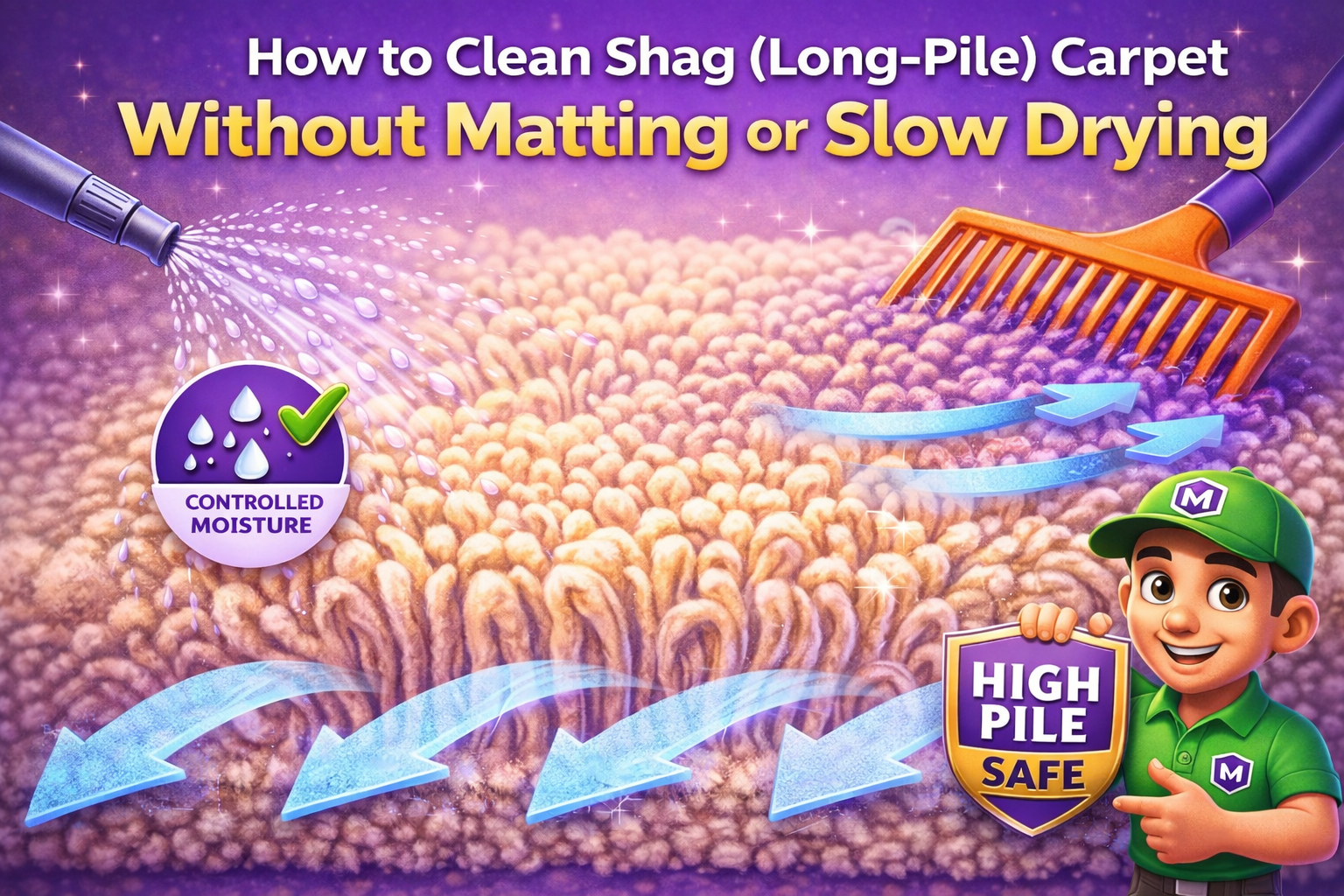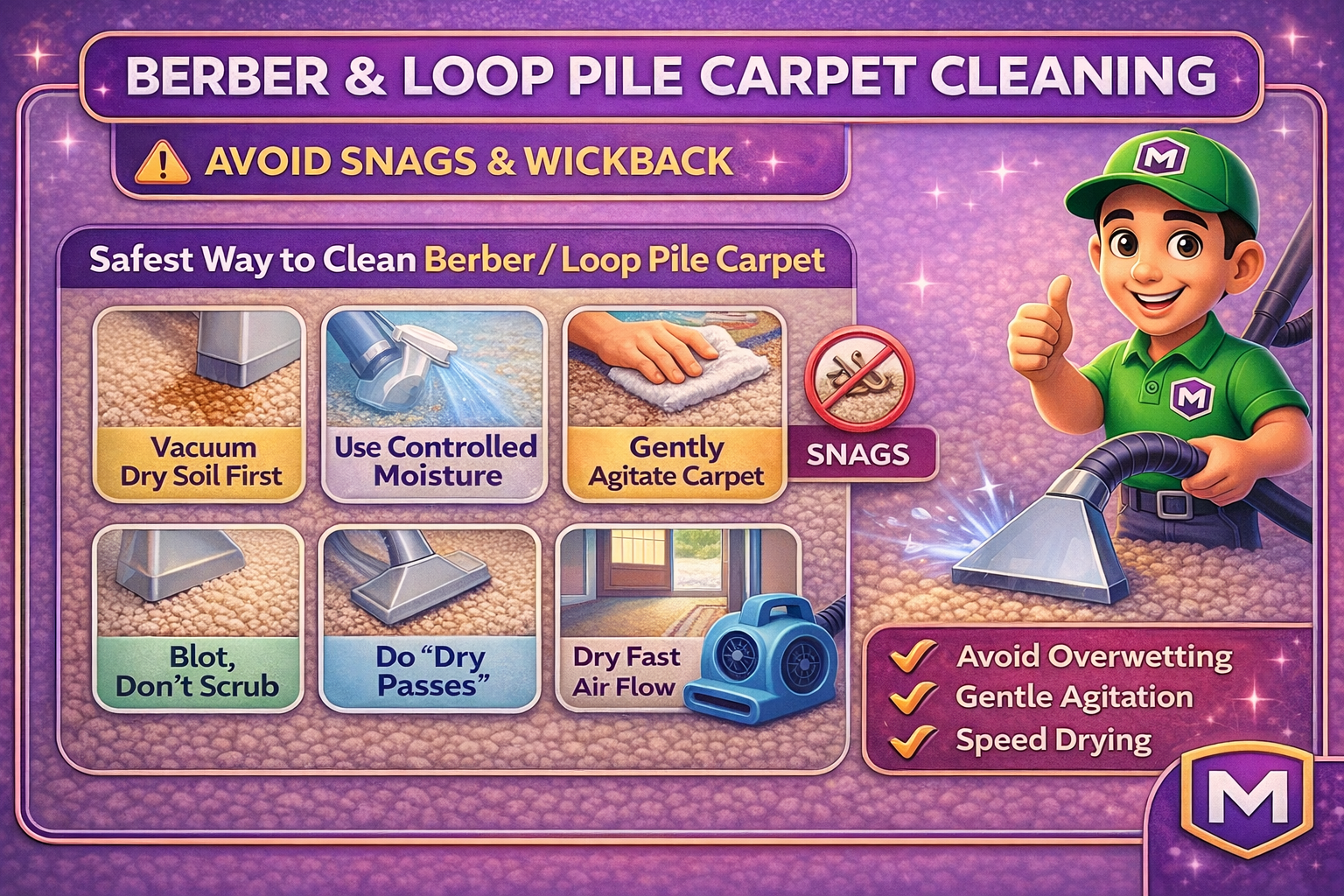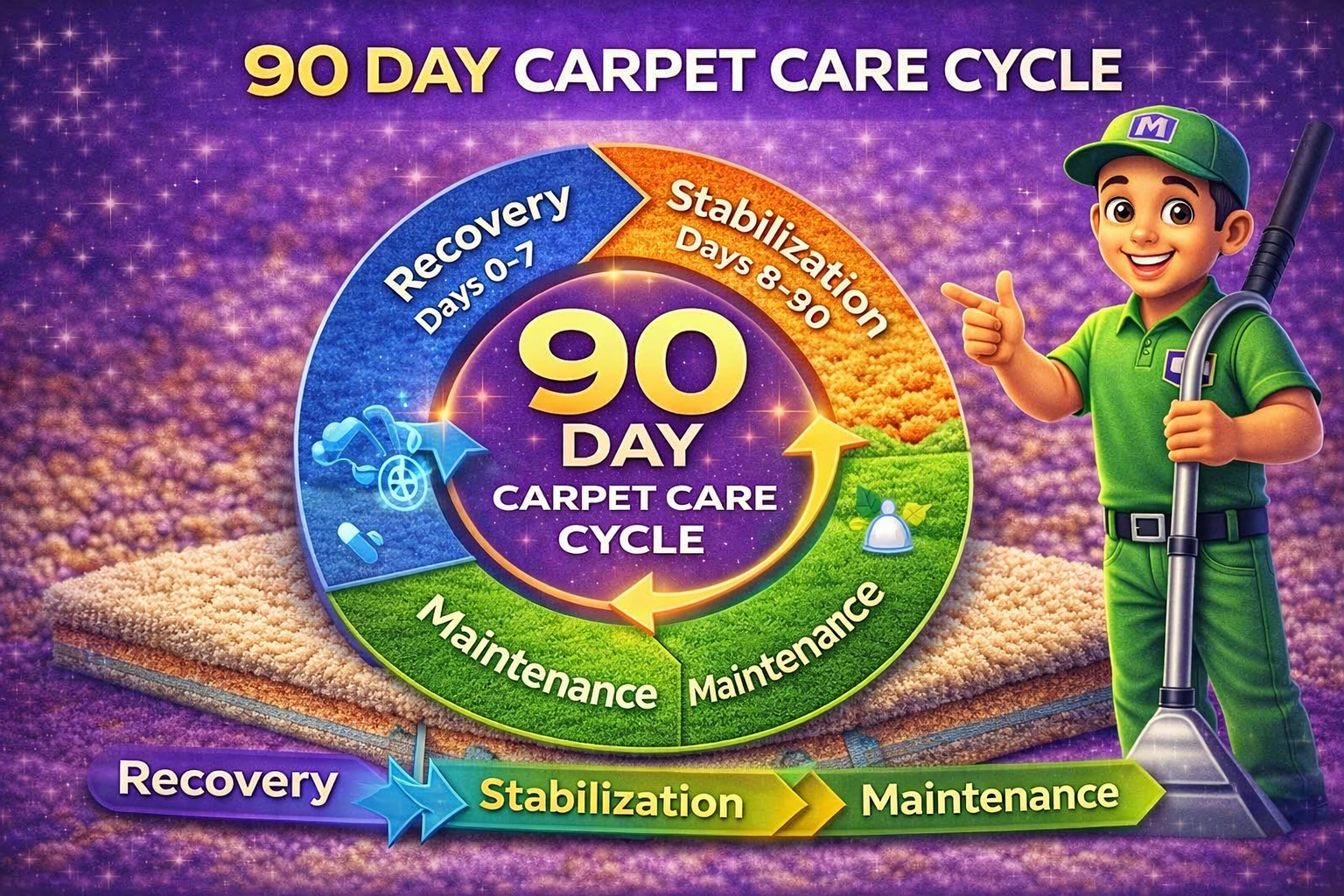Identifying and Treating Different Types of Grout Stains (Oregon Edition)
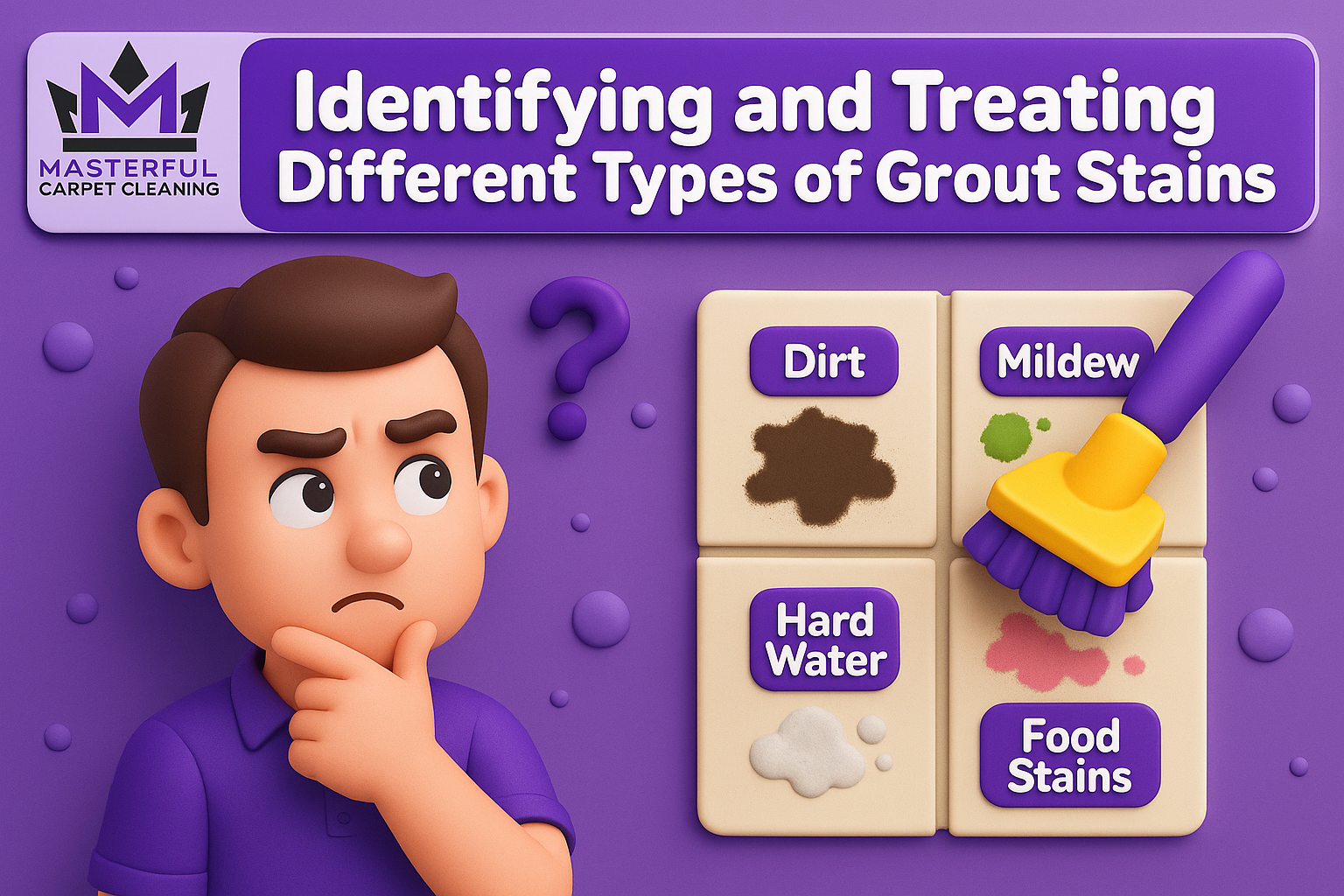
Before you can clean grout effectively, it’s important to recognize what type of stain you’re dealing with. Different stains have different causes, and in Oregon, our damp climate and mineral-rich water supply make certain issues more common. Correct identification means you choose the right treatment method and avoid damaging your grout or tile.
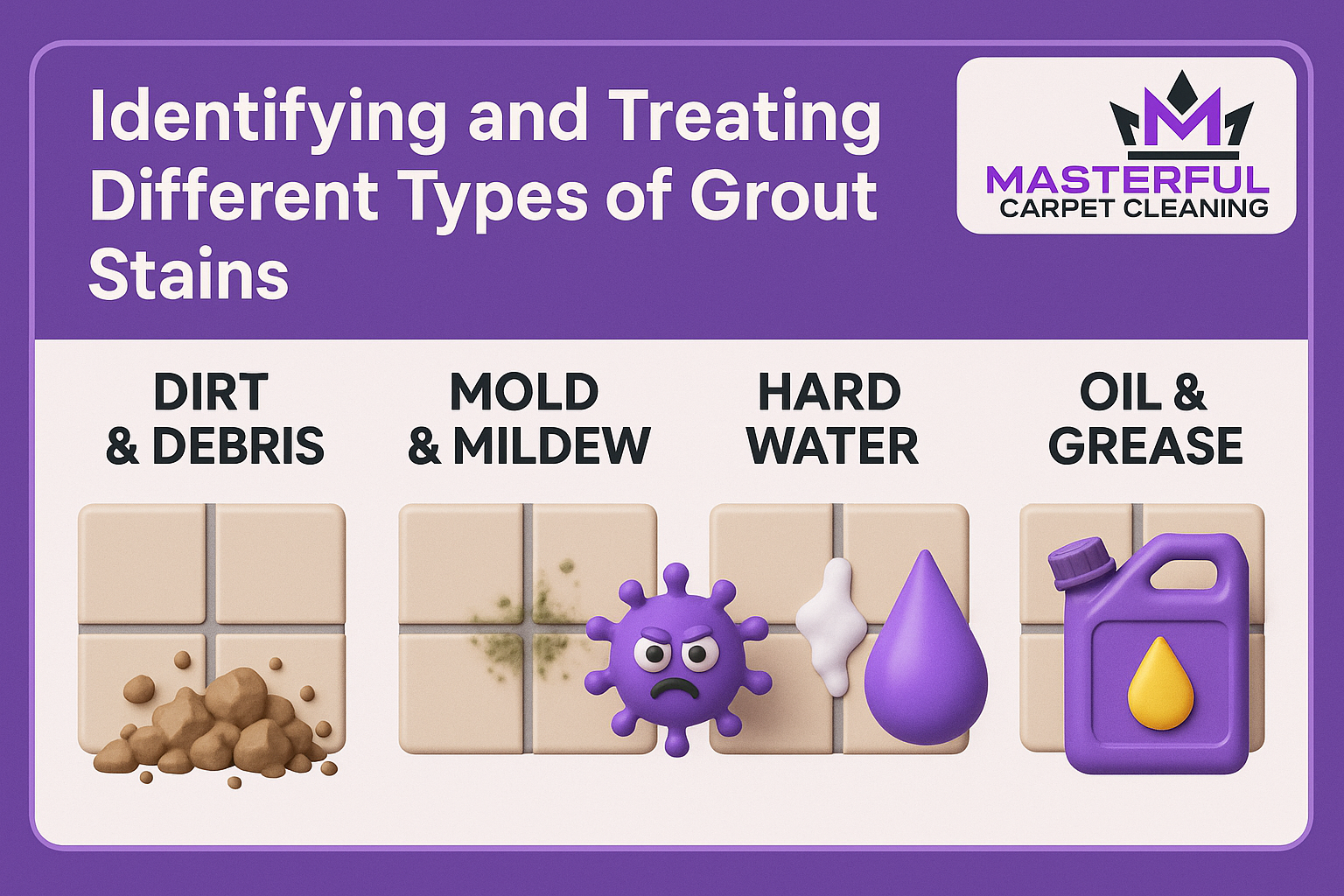
Mold and Mildew Stains
Mold and mildew loves warm, moist environments, which makes bathrooms, kitchens, and basements across Oregon especially vulnerable. These stains usually appear as black, green, or gray discoloration along grout lines.
- Mold tends to be darker, more stubborn, and often appears in patches. It can release spores that worsen allergies and respiratory conditions.
- Mildew is typically lighter in color, spreading as a surface film that can be wiped away more easily than mold.
Key diagnostic cue: If the stain has a musty odor and keeps returning after surface cleaning, you are most likely dealing with mold.
Rust and Hard Water Stains
Oregon homes often experience issues with mineral-rich water. Hard water leaves behind white, chalky deposits (calcium and magnesium buildup), while rust appears as reddish-brown streaks caused by iron in water pipes, fixtures, or well systems.
- Rust stains tend to form near drains, faucets, or anywhere metal meets water.
- Hard water stains spread across larger areas of grout, often accompanied by hazy residue on nearby tiles.
Key diagnostic cue: If the stain feels rough or crusty to the touch, it’s likely a mineral deposit rather than surface dirt.
Food, Beverage, and Pet Urine Stains
Grout is porous, which means everyday spills can seep in and leave lasting marks. Oregon households with pets and busy kitchens often encounter:
- Tannin stains from coffee, tea, or wine, which show up as brown or yellowish blotches.
- Juice or sauce spills, which can leave colorful marks that spread quickly if not cleaned.
- Pet urine, which penetrates grout and may cause yellow staining and lingering odor. Beyond appearance, urine can promote bacterial growth, making professional treatment advisable.
Key diagnostic cue: If the stain is localized to a spill or accident area, and carries odor, it’s likely organic in nature.
Efflorescence vs White Haze
One of the most commonly misdiagnosed grout problems is efflorescence, a white, powdery film caused by salts migrating to the grout surface. Oregon’s high rainfall and groundwater moisture make efflorescence especially common in basements, entryways, and ground-level tiling.
- Efflorescence can be brushed off, but returns if moisture control isn’t addressed.
- Sealer haze, on the other hand, appears after improper grout sealing and has a cloudy, sticky texture.
Key diagnostic cue: If the haze dissolves when lightly moistened, it’s likely efflorescence. If it smears or feels tacky, it’s sealer haze.
👉 Pro Tip for Oregon Homeowners: Because Oregon’s climate encourages both moisture-driven efflorescence and mold growth, always distinguish between the two before cleaning. Treating efflorescence with mold cleaners (or mold with efflorescence removers) won’t solve the problem.
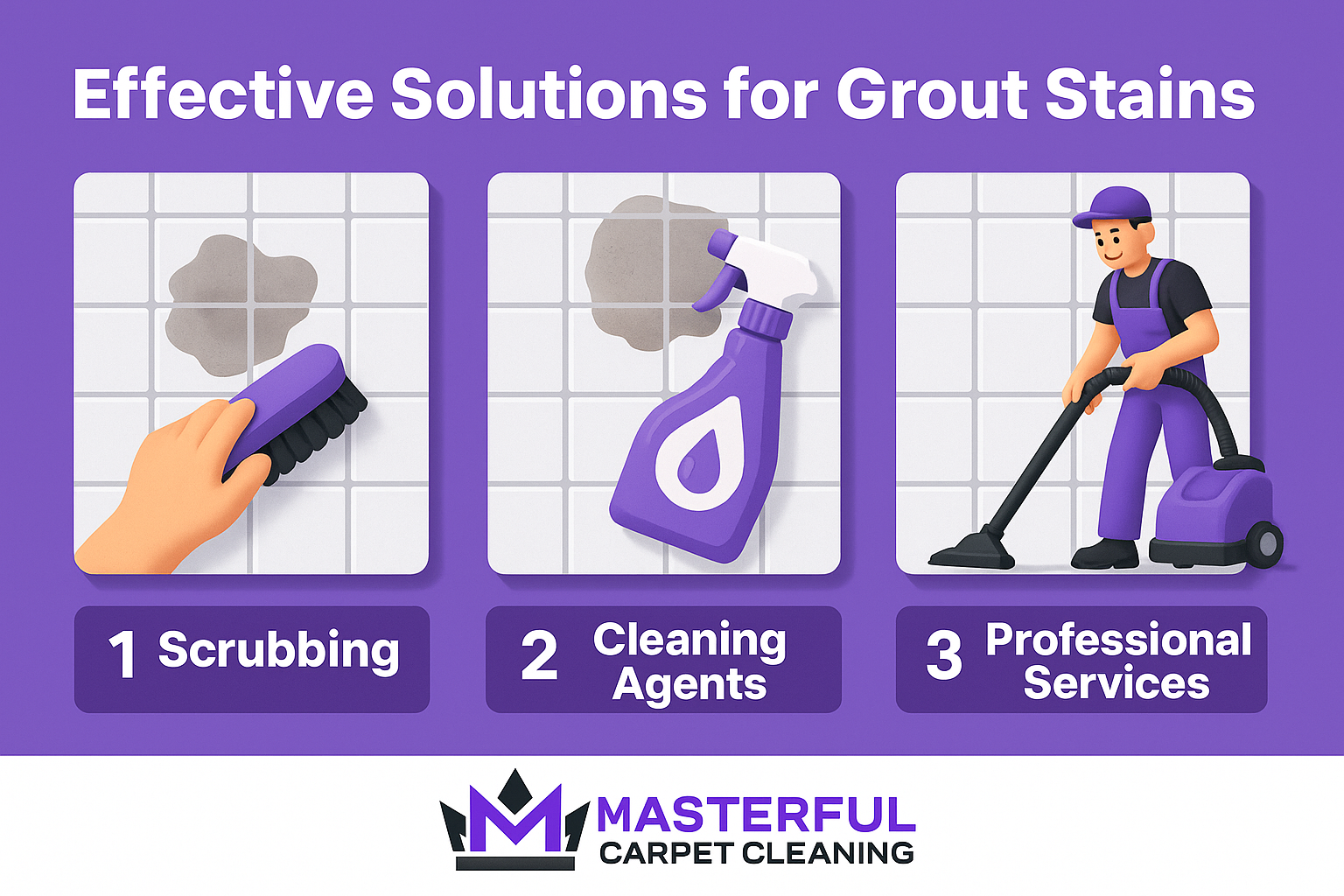
Effective Methods to Remove Grout Stains
Once you’ve identified the type of grout stain, the next step is choosing the right cleaning method. Not all stains respond to the same approach, and some treatments can actually damage grout if applied incorrectly. The safest way to approach grout cleaning is with an escalation method: start with mild solutions, then move up to stronger cleaners or professional methods only if needed.
Mild DIY Remedies (Safe First Step)
For most surface-level stains, Oregon homeowners can start with gentle, inexpensive cleaning solutions:
- Baking Soda Paste: Mix baking soda with water into a paste, apply to grout, let sit 10-15 minutes, and scrub with a soft brush.
- Vinegar & Water Solution: Effective against mildew and light discoloration, though not recommended for natural stone tile.
- Soap & Warm Water: Regular dish soap can loosen grease and food-based stains.
👉 Best for: light mold, surface dirt, early stains. 👉 Avoid if: you have marble, limestone, or other acid-sensitive tiles (vinegar can etch).
Moderate Cleaning Agents (Deeper Penetration)
When mild remedies don’t work, step up to stronger, but still homeowner friendly options:
- Hydrogen Peroxide (3%): Good for disinfecting and whitening mold or mildew stains.
- Oxygen Bleach (powdered): Safe for most grout and effective on organic stains like wine or food.
- Enzyme Cleaners: Designed to break down organic matter such as pet urine or food spills.
👉 Best for: stubborn mildew, pet accidents, food/beverage stains. 👉 Avoid if: grout is already weakened or crumbling., Aggressive/Specialty Cleaners
For severe discoloration, especially rust, efflorescence, or long neglected grout, specialty products may be necessary:
- Acidic Cleaners (oxalic, citric, muriatic): Effective against rust and mineral buildup.
- Commercial Grout Haze Removers: Target residue left after tile installation.
⚠️ Warning: Acidic cleaners can erode grout and damage natural stone surfaces like travertine or marble. Always test in a hidden spot first, and wear protective gear.
👉 Best for: heavy rust stains, hard water deposits, efflorescence. 👉 Avoid if: tile is porous or acid-sensitive.
Steam Cleaning (Eco-Friendly Option)
When chemical solutions aren’t enough, or when you want a chemical free method, steam cleaning is a strong alternative. Professional-grade steam cleaners use high-pressure vapor to:
- Kill mold spores and bacteria.
- Dissolve grease and soap scum.
- Penetrate porous grout for deep cleaning.
👉 Best for: eco-conscious homeowners, families with children/pets, and anyone sensitive to harsh chemicals. 👉 Avoid if: grout is already cracked or loose, as high-pressure steam may worsen damage.
Choosing the Right Cleaner
| Cleaner Type | Best For | Risks / Limitations | Tile Compatibility | DIY or Professional |
|---|---|---|---|---|
| Baking Soda / Soap | Light dirt, surface stains | Limited on deep-set stains | Safe on all tiles | DIY |
| Vinegar Solution | Mildew, light discoloration | Damages natural stone | Ceramic/porcelain only | DIY |
| Hydrogen Peroxide | Mold, mildew, whitening | Can bleach colored grout over time | Safe on most tiles | DIY |
| Oxygen Bleach | Organic stains, pet urine | Requires longer dwell time | Safe on most tiles | DIY |
| Enzyme Cleaners | Pet accidents, food stains | Less effective on mineral stains | Safe on all tiles | DIY |
| Acidic Cleaners | Rust, efflorescence, deposits | Can etch grout, harm stone tiles | Use cautiously | Pro recommended |
| Steam Cleaning | Deep-set stains, mold | May weaken loose grout | All except damaged grout | DIY (small) / Pro |
👉 Pro Tip for Oregon Homes: Because Oregon’s water often carries iron and mineral content, rust and hard water stains are common. If you notice recurring buildup, you may need both cleaning and preventive sealing, which we’ll cover in the next section.
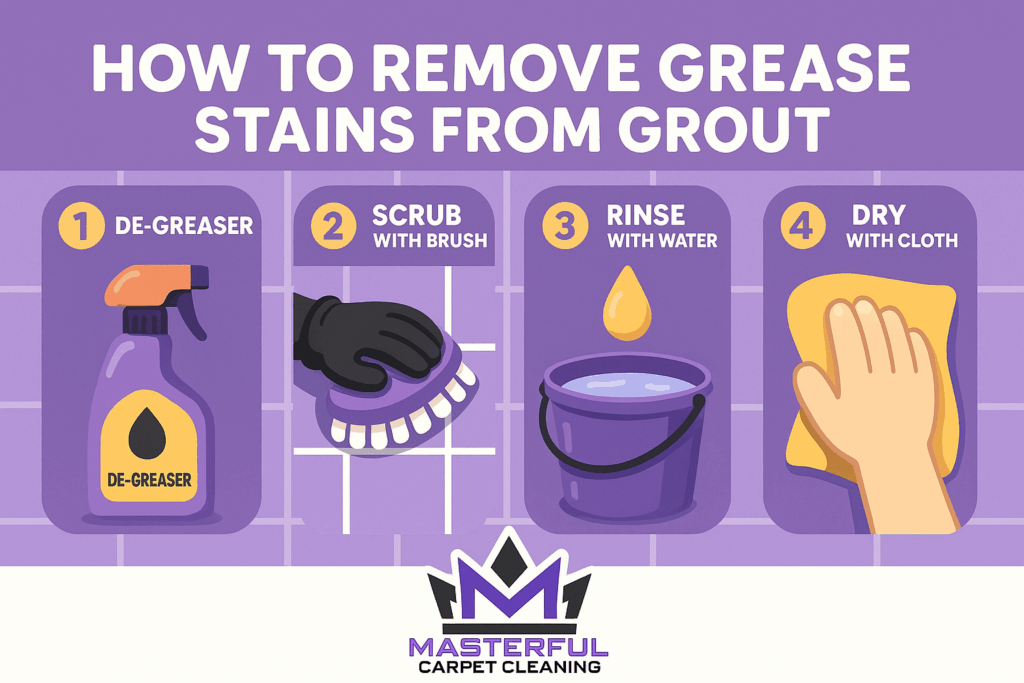
Preventing Future Grout Stains in Oregon Homes
Cleaning grout is only half the battle. Without proper protection, stains can return quickly, especially in Oregon’s damp, rainy climate. Preventive care not only keeps grout looking fresh but also extends the life of your tile surfaces. Here are proven strategies for protecting grout in Pacific Northwest homes.
Grout Sealing for Long-Term Protection
Because grout is porous, it naturally absorbs moisture, dirt, and stains. Sealing creates a protective barrier that reduces absorption and makes future cleanings easier.
- Penetrating Sealers: Absorb into grout, protecting from within. Best for kitchens and bathrooms in Oregon homes.
- Topical Sealers: Form a surface layer that repels spills but may wear down faster in high-traffic areas.
👉 Recommendation: In humid regions like Portland and Salem, reseal grout every 12-18 months for lasting protection.
Moisture & Ventilation Control
Oregon’s rainy seasons mean higher indoor humidity, which encourages mold and mildew growth. Managing moisture is key to preventing stains.
- Install or upgrade bathroom exhaust fans.
- Use dehumidifiers in basements or poorly ventilated spaces.
- Wipe down tile and grout after showers to prevent standing moisture.
👉 Tip: Even sealed grout can discolor if exposed to constant dampness. Keeping air circulating reduces long-term issues.
Anti-Mold Coatings & Additives
For bathrooms, showers, and laundry rooms, consider adding extra protection:
- Anti-microbial sealers: Some professional-grade sealers include mold and mildew fighting agents.
- Specialty coatings: Used in commercial kitchens and rental properties where heavy use is common.
👉 These coatings are especially valuable in older Oregon homes with less advanced ventilation systems.
Routine Cleaning & Maintenance Schedule
A consistent cleaning routine helps prevent buildup before it becomes a stain.
- Weekly: Wipe grout with a pH-neutral cleaner or warm water + mild soap.
- Monthly: Inspect grout for early discoloration, especially around sinks, tubs, and entryways.
- Annually: Deep clean grout lines and reapply sealer as needed.
👉 Tip for Pet Owners: Clean spills and accidents immediately, especially pet urine, which penetrates grout quickly.
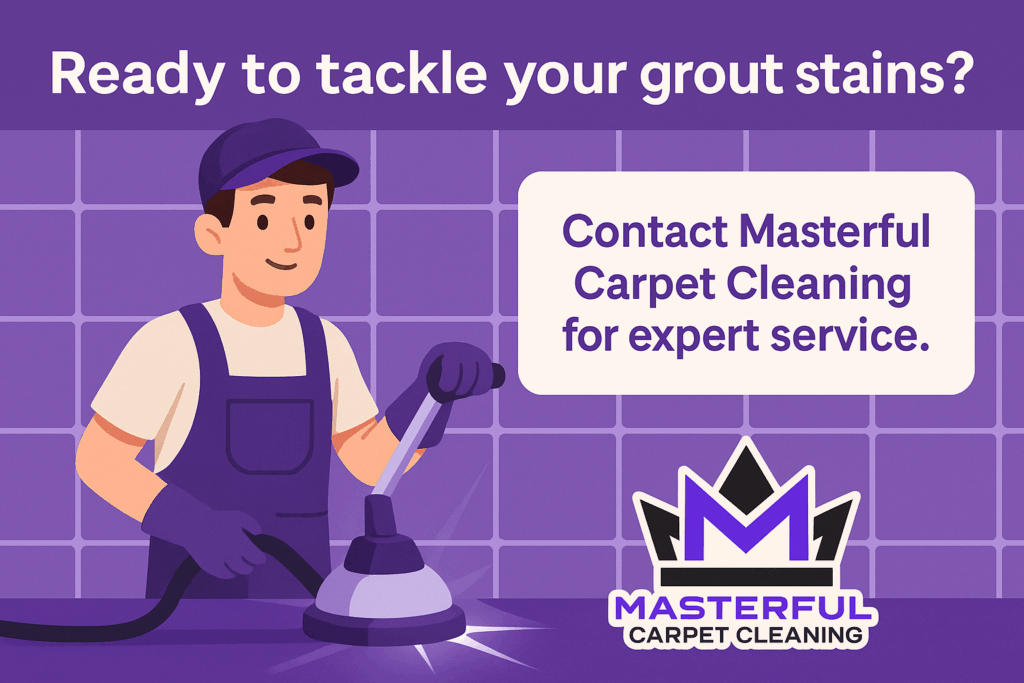
When Cleaning Isn’t Enough – Restoration Options
Even with the best cleaning methods, some grout stains are too deep or permanent to remove. Over time, grout can absorb pigments, minerals, or organic material that won’t respond to household cleaners. In these cases, restoration is the best way to bring back the look and function of your tile surfaces. Oregon homeowners often turn to recoloring, regrouting, or full professional restoration when cleaning alone no longer works.
Grout Recoloring (Cosmetic Refresh)
If your grout is permanently discolored but still structurally sound, recoloring offers an affordable solution.
- Color Sealing: A tinted sealer applied over existing grout lines. This not only changes the grout color but also adds a protective barrier against future stains.
- Benefits: Evens out discoloration, refreshes the look of old grout, and extends lifespan.
- Oregon Tip: Many Portland homeowners use color sealing to modernize kitchens or bathrooms without a full remodel.
Regrouting (Partial or Full Replacement)
When grout is cracked, crumbling, or beyond cosmetic repair, regrouting is often the best option.
- Partial Regrouting: Only the damaged or stained sections are removed and replaced.
- Full Regrouting: Old grout is completely removed and new grout is installed across the entire surface.
- Costs in Oregon: Typically $8-$25 per square foot, depending on tile size, condition, and labor.
👉 Best for: Bathrooms or kitchens where grout is deteriorating or permanently stained.
Professional Restoration Services
For the most severe cases, or for homeowners who want a guaranteed transformation, professional restoration offers advanced methods beyond DIY capability.
- High-Pressure Steam Cleaning: Penetrates deeply into grout pores, removing stains and bacteria.
- Chemical Flush & Extraction: Professional-grade cleaning agents paired with suction equipment for maximum stain removal.
- Tile Polishing & Sealing: Restores both tile and grout, leaving surfaces stain-resistant and easier to maintain.
👉 Why Oregon Homes Benefit: With constant dampness in the Pacific Northwest, professional restoration ensures grout lines are fully sanitized and sealed against recurring mold or efflorescence.
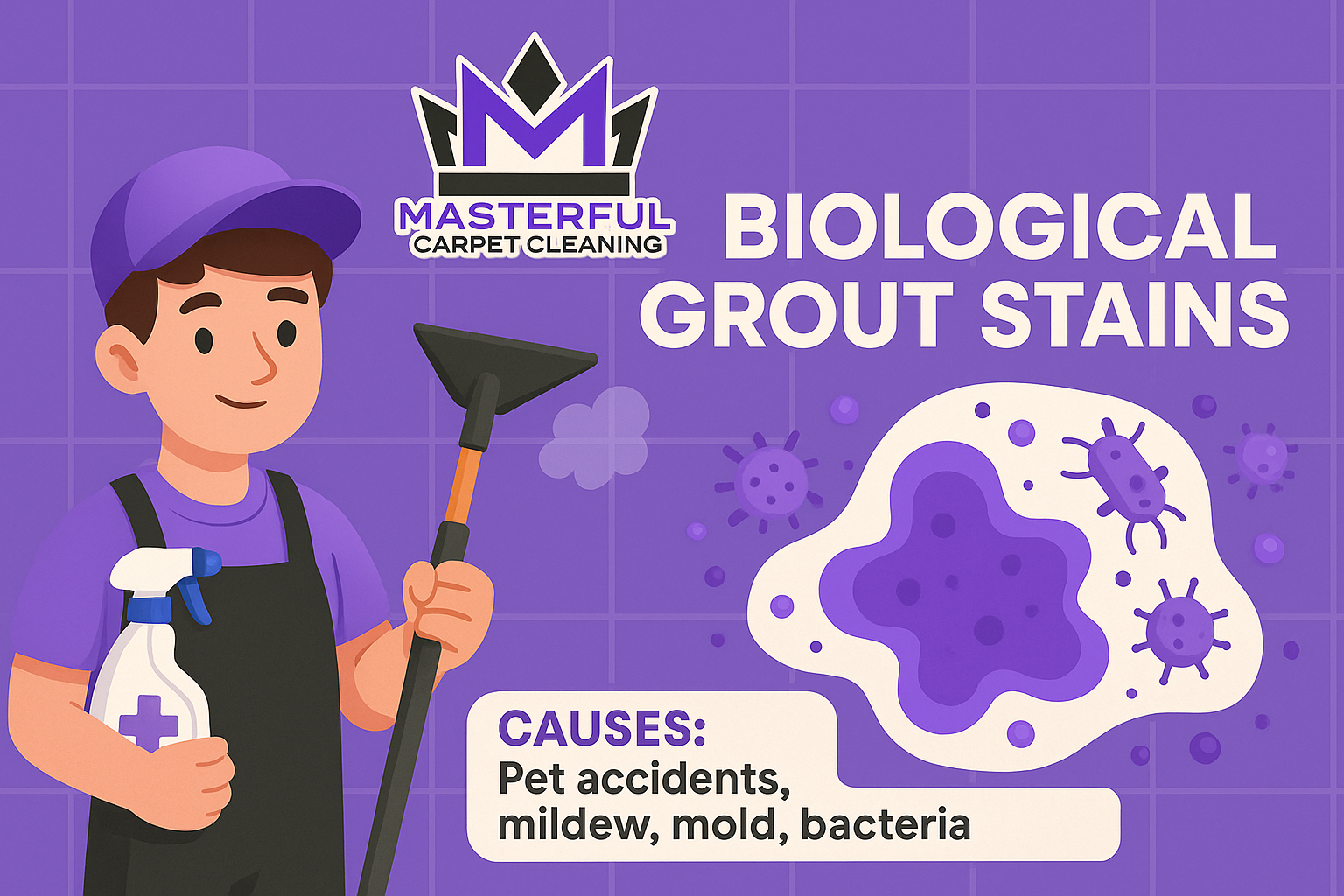
DIY vs Professional Grout Cleaning in Oregon
When it comes to grout stains, many Oregon homeowners start with do-it-yourself methods. While this can be effective for light stains, it’s not always the best choice for deeper discoloration, mold growth, or fragile tile surfaces. Knowing when to handle grout cleaning yourself and when to call in professionals can save both time and money.
When DIY Makes Sense
DIY grout cleaning is ideal if:
- Stains are light and recent (e.g., food spills, soap scum).
- You’re dealing with small areas, such as a backsplash or a single shower wall.
- You want a low-cost solution and don’t mind putting in the elbow grease.
👉 Common DIY tools: baking soda, vinegar, mild detergents, small brushes, and household steamers.
Risks of DIY Grout Cleaning
While DIY can be cost-effective, it has limitations and risks:
- Surface Damage: Using acidic cleaners incorrectly can etch grout or tile.
- Hidden Mold: Home cleaning often doesn’t penetrate deep enough to kill mold spores.
- Uneven Results: Some areas may remain stained, leading to frustration.
- Time Investment: Scrubbing grout lines manually can be labor-intensive for larger spaces.
When to Call a Professional in Oregon
Professional grout cleaning is recommended if:
- Grout has deep-set mold or mildew that poses health risks.
- You notice efflorescence or recurring white haze.
- Stains cover large floor areas or multiple bathrooms.
- You have natural stone or delicate tile that requires specialized care.
- Grout is crumbling, cracked, or discolored beyond DIY remedies.
👉 Oregon homeowners often rely on pros for bathrooms, kitchens, and basements, where humidity and water exposure are highest.
What Professionals Offer
Local experts like Masterful Carpet Cleaning provide:
- High-pressure steam cleaning to sanitize grout.
- Specialized chemical treatments safe for tile and stone.
- Grout sealing and color sealing to prevent future stains.
- Restoration services including regrouting and tile polishing.
Cost Comparison in Oregon
- DIY cleaning: <$50 in supplies.
- Professional grout cleaning: $326-$729 in the Portland metro area (HomeAdvisor average).
- Regrouting / color sealing: $8-$25 per sq. ft., depending on tile size and condition.
👉 While professional cleaning costs more upfront, it provides longer-lasting results and reduces the need for frequent touch-ups.
If your stains are mild, DIY can be a smart starting point. But for persistent, large, or health-related issues, hiring professionals ensures grout is properly cleaned, sealed, and protected, especially important in Oregon’s damp climate.
👉 Call Masterful Carpet Cleaning today for expert grout cleaning in Portland, Salem, Eugene, and surrounding Oregon communities.
FAQs: Grout Stain Cleaning in Oregon
Grout cleaning comes with many questions, especially for Oregon homeowners dealing with damp weather and mineral-rich water. Here are answers to some of the most common.
How much does grout cleaning cost in Portland, OR?
On average, professional grout cleaning in the Portland area costs $326-$729, depending on the size of the space, severity of stains, and whether sealing or restoration is included. Small jobs may fall below $300, while larger floor areas or multi-room projects can exceed $700.
How often should grout be resealed in Oregon homes?
Because Oregon has a damp climate with high humidity, it’s best to reseal grout every 12-18 months. Bathrooms, basements, and kitchens may require sealing closer to the 12-month mark due to constant moisture exposure.
What is the best grout cleaner for mold?
For mild cases, hydrogen peroxide or oxygen bleach works well against mold. For recurring or deep-set mold, professional steam cleaning is the safest and most effective option. Oregon homeowners should be cautious with bleach, as it can discolor grout and doesn’t always kill mold at the root.
Can steam cleaning replace chemicals for grout?
Yes, steam cleaning is an eco-friendly, chemical-free alternative that works especially well for mold, mildew, and grease stains. It penetrates grout pores and sanitizes deeply. If grout is cracked or heavily damaged, steam may not be enough on its own.
What causes white haze on grout in Oregon’s damp climate?
The white haze is often efflorescence, salt deposits that rise to the surface due to moisture migration. Oregon’s rainy conditions make efflorescence common in basements, entryways, and ground-level tile. In some cases, haze may be caused by sealer residue left after improper application.
Should I regrout or recolor my grout lines?
- Recoloring (color sealing): Best if grout is stained but still solid.
- Regrouting: Necessary if grout is crumbling, cracked, or permanently damaged. Oregon homeowners often choose recoloring as a cosmetic refresh, while regrouting is reserved for structural repairs.
Keep Your Grout Looking Fresh and Protected
Grout stains are more than just cosmetic, they can signal mold, water damage, or long-term wear that affects the beauty and safety of your home. By learning to identify different stain types, choosing the right treatment methods, and following a prevention routine, you can extend the life of your grout and tile surfaces.
Still, some stains go beyond what DIY methods can fix. That’s when restoration services like recoloring, regrouting, or professional steam cleaning become essential.
For Oregon homeowners, where damp weather and mineral-rich water make grout especially vulnerable, staying proactive is the key to healthy, great-looking floors and walls.
👉 Call Masterful Carpet Cleaning Today If your grout is stained, discolored, or overdue for sealing, let the experts handle it. Masterful Carpet Cleaning proudly serves Portland, Salem, Eugene, Corvallis, and surrounding Oregon communities with:
- Professional tile & grout cleaning
- Grout sealing and recoloring
- Restoration and regrouting services
- Eco-friendly steam cleaning options
📞 Contact us today to schedule your grout cleaning service in Oregon and bring your tile back to life.
As the Co-Owner of Masterful, Randy has been providing quality cleaning services to the Salem and Portland areas of Oregon for many years. He has built a reputation for excellence in the industry. His team take prides in using the latest cleaning techniques and technologies to deliver exceptional results every time.Author

